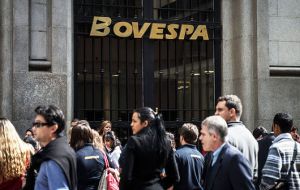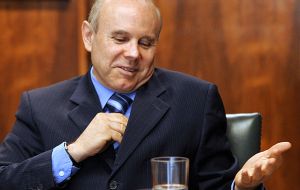MercoPress. South Atlantic News Agency
Brazil's markets react negatively to Rousseff's re-election; waiting for new finance minister name
 Bovespa closed Monday down 2.8%; Petrobras was the biggest loser, with shares down 12.3% and the Brazilian Real sank to its lowest value in nine years
Bovespa closed Monday down 2.8%; Petrobras was the biggest loser, with shares down 12.3% and the Brazilian Real sank to its lowest value in nine years  Mantega said that re-election of Dilma shows a majority of Brazilians approve the current economic policy
Mantega said that re-election of Dilma shows a majority of Brazilians approve the current economic policy A sharp drop in Brazil’s financial markets signalled investors are unsure whether the newly re-elected President Dilma Rousseff will take the necessary steps to reinvigorate the country’s stalled economy.
Bovespa fell 6% in the opening minutes of trading and finished the day down about 2.8%. The government managed Petrobras was the biggest loser, with shares down 12.3%. The Brazilian Real sank to its lowest value in nine years to 2.52 against the U.S. dollar.
The Brazilian economy – the world’s seventh largest, long considered one of the most promising emerging markets – has run out of steam and contracted in the past two quarters.
While global factors, particularly China’s diminished appetite for commodities and food exports, have caused some of the problem, President Rousseff’s administration is also widely criticized here for its statist approach to economic management.
The government has maintained artificially low prices on fuel and other staples, a policy popular with its low-income base, and high spending rates that have eaten away the budget surplus.
Rousseff now faces a host of big challenges. There is a critical nationwide drought that threatens not just water supplies but also electricity generation, and she has a narrower mandate than any president since the end of the dictatorship.
But the biggest by far is the state of the economy. She was unusually conciliatory in her victory speech on Sunday. But while Brazilians from across the political spectrum seem certain of what steps she should take to reignite growth and woo investors – far fewer seem certain she will take them.
“The biggest uncertainty is who will manage the Ministry of Finance for the next term: What we would like to see is someone who is more pro-market than what we have had so far,” said Walter Novaes, a professor of economics at the Pontifical Catholic University of Rio de Janeiro. “Next year will be hard – the fiscal balance is in bad shape and the government will not be able to do too much because expenses are already budgeted. So we need someone to inspire entrepreneurs and the business community to invest.”
Rousseff has said she will replace her current Finance Minister but refused, during the campaign, to say whom she would appoint, apparently out of a desire not to be seen to be pandering to the financial world. Her reticence contributed to the wild gyrations of the markets through the past few weeks. There is intense speculation about a short list of names here; the lead candidate is rumoured to be Nelson Barbosa, a former director in the Finance Ministry who quit over his disagreements with the Rousseff government.
But some analysts doubt whether Ms. Rousseff is actually prepared to appoint someone whose views don’t overshadow her own, or whether she is prepared to stop acting as her own Finance Minister, as she was widely seen to do for the past four years.
Remarks on Monday from Guido Mantega, the current Finance Minister, did little to boost confidence: He told reporters in Brasilia that the government’s re-election shows that the majority of Brazilians approve of the current economic policy. He said controlling inflation would continue to be a priority going forward, and that “fiscal fundamentals” needed to be in order, but also emphasized the importance of continuing to expand employment and the internal market.




Top Comments
Disclaimer & comment rules-

-

-

Read all commentsTower to the bridge....tower to the bridge....there are icebergs dead ahead!!!!
Oct 28th, 2014 - 09:08 am 0Throughout the election campaign in no time no word was mentioned about the United States and its satellites countries.
Oct 28th, 2014 - 09:44 am 0The Brazilian people have shown absolute indifference to Western.
It is. The life of loan sharks is becoming increasingly difficult.
https://www.youtube.com/watch?v=NN9RwpNAZFQ&index=2&list=FLmXPTu1f8AdGlizWNiASx2A
#2
Oct 28th, 2014 - 10:43 am 0A nice looking aircraft which should do well.
However, I am sure you will give due credit to Western countries who supplied the engines, electronics, carbon composites, control systems etc etc without which the aircraft could not be built. http://www.airframer.com/aircraft_detail.html?model=C-390
Commenting for this story is now closed.
If you have a Facebook account, become a fan and comment on our Facebook Page!